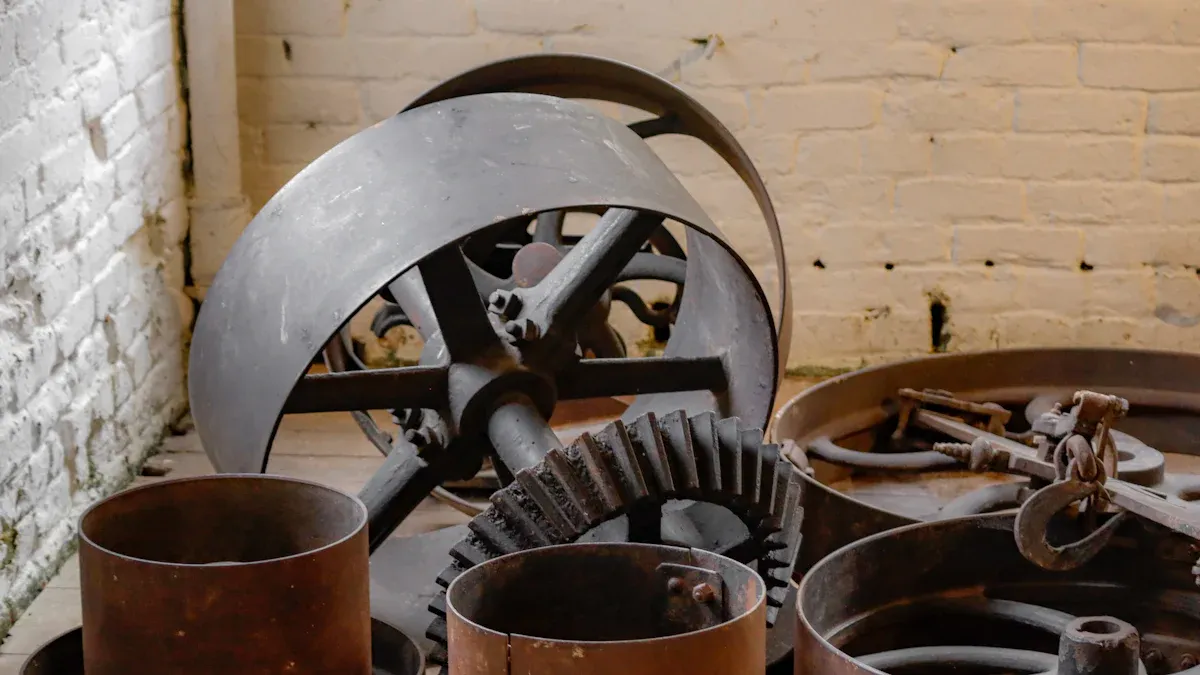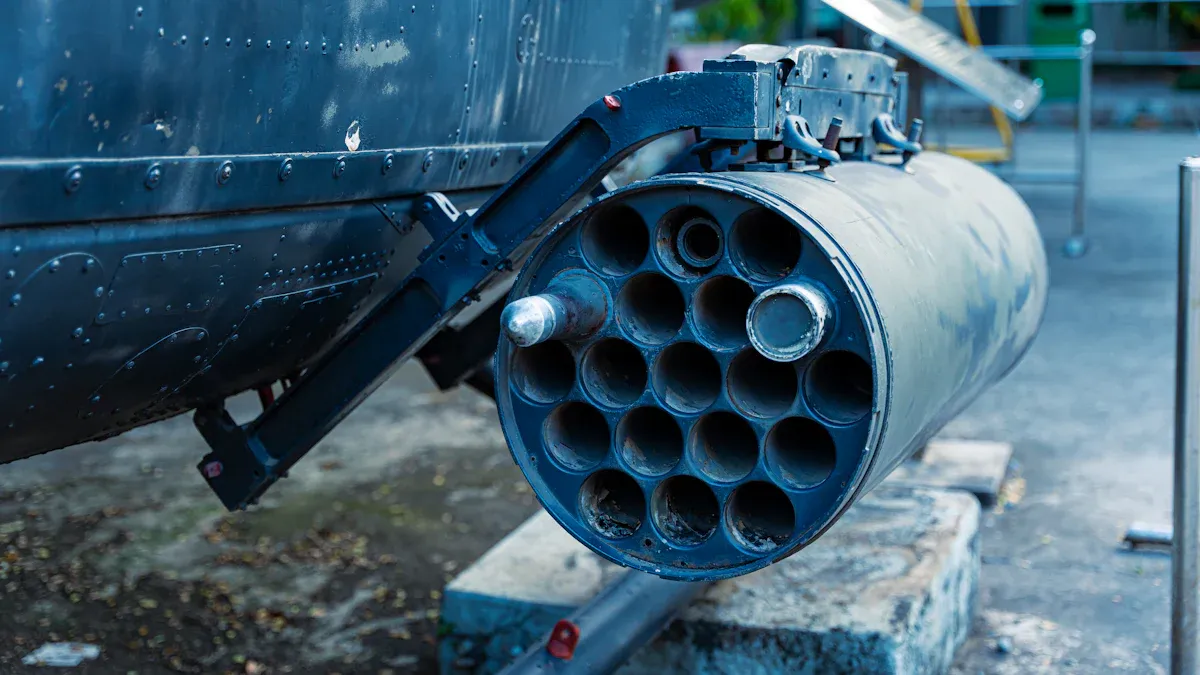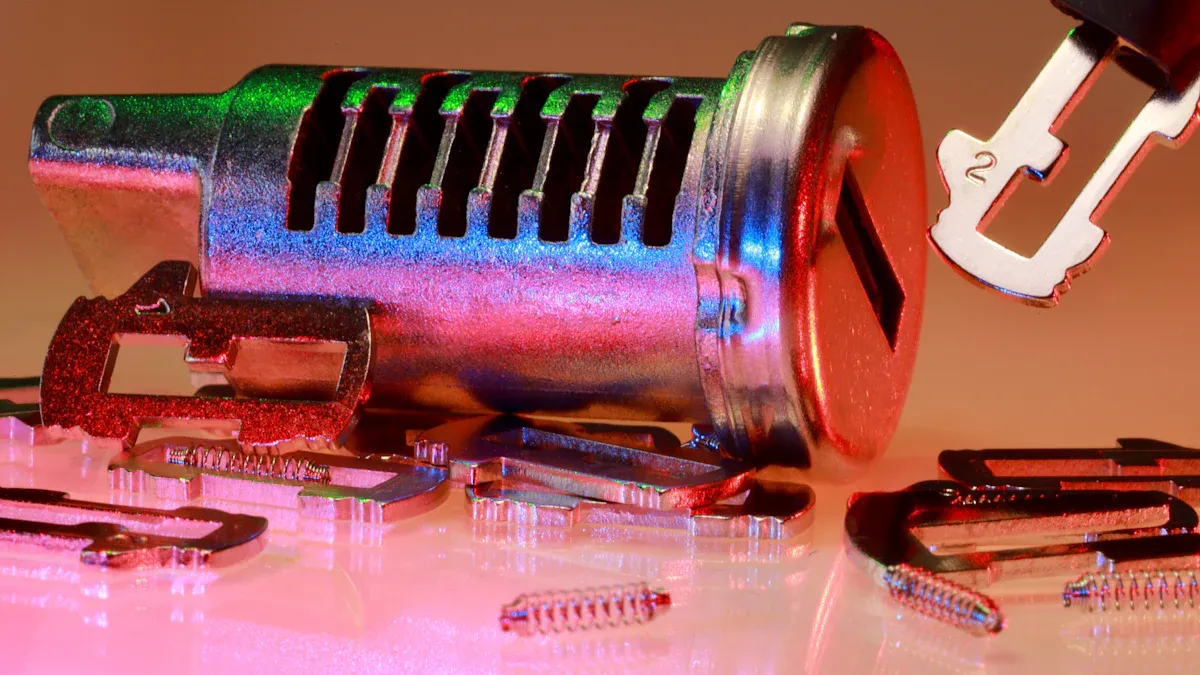
Twin screw extruder barrels play a vital role in manufacturing processes like plastic pipe production lines and PVC pipe extrusion plants. These barrels come in two main types: co-rotating and counter-rotating. Co-rotating barrels have screws that turn in the same direction, while counter-rotating barrels feature screws that spin in opposite directions. This difference affects mixing, torque, and energy efficiency.
Understanding these distinctions is crucial. For example, the counter-rotating twin-screw extruder market is expected to grow significantly, from USD 1.2 billion in 2024 to USD 2.5 billion by 2033. Such trends highlight the importance of choosing the right barrel type for applications, whether in a single screw plastic extruder machine or other systems.
What Are Co-Rotating Twin Screw Extruder Barrels?

Design and Working Mechanism
Co-rotating twin screw extruder barrels are designed with screws that rotate in the same direction. This synchronized movement creates a self-wiping action, which prevents material buildup and ensures efficient mixing. Engineers validate the design through technical schematics and engineering studies. These studies predict key parameters like pressure, temperature, and residence time distribution.
| Aspect | Description |
|---|---|
| Model Predictions | Predicts transient and stationary behavior for pressure, filling ratio, temperature, and residence time distribution. |
| Validation Method | Comparison of model predictions with experimental data from lab and production scale machines. |
| Application Example | Living polymerization of -caprolactone with tetrapropoxytitanium as the initiator. |
| Flow Representation | Validated using experimental residence time distributions. |
| Agreement with Data | Comparison with industrial plant data shows good agreement after optimal fitting of rate coefficients. |
The operation of these barrels depends on factors like screw speed and barrel temperature. Design elements, such as screw geometry and die design, also influence performance.
Key Features
Co-rotating twin screw extruder barrels offer several standout features:
- Enhanced mixing and compounding due to the co-rotation of screws.
- Modular screw designs allow for customization to meet specific processing needs.
- High-strength alloy steel screws ensure durability and performance.
- Zonal control in barrels enables precise temperature and pressure adjustments.
These features make them ideal for handling a wide range of materials, including those requiring uniform dispersion or shear-sensitive processing.
Common Applications
Co-rotating twin screw extruder barrels are widely used in industries that demand high mixing efficiency. They are commonly found in:
- Plastic compounding and masterbatch production.
- Food processing, such as producing snacks or pet food.
- Pharmaceutical applications, including drug formulation.
Their versatility and efficiency make them a popular choice for manufacturers aiming to optimize production processes.
What Are Counter-Rotating Twin Screw Extruder Barrels?
Design and Working Mechanism
Counter-rotating twin screw extruder barrels feature two screws that rotate in opposite directions. This unique design creates a squeezing action, which is ideal for processing materials that require gentle handling. The screws intermesh tightly, ensuring precise control over the material flow. This setup also allows for better control of heating and cooling, making it suitable for complex manufacturing tasks.
- These barrels use two intermeshing screws to push material efficiently through the barrel.
- They provide excellent control over mixing, heating, and cooling.
- The design is perfect for applications requiring consistent quality and precision.
Counter-rotating barrels are often used in industries where maintaining material integrity is critical. Their ability to handle sensitive materials without compromising quality makes them a valuable tool in manufacturing.
Key Features
Counter-rotating twin screw extruder barrels offer several notable features:
- Gentle material handling to prevent degradation.
- Precise temperature control for consistent processing.
- High torque capacity for handling viscous materials.
- Durable construction for long-term use in demanding environments.
These features make them a reliable choice for manufacturers looking to achieve consistent results in their production processes.
Typical Applications
Counter-rotating twin screw extruder barrels are widely used across various industries. Some common applications include:
- Plastic processing, such as producing PVC profiles, pipes, and films.
- Compounding and masterbatch production for uniform mixing of fillers and additives.
- Reactive extrusion, enabling in-line chemical reactions with precise control.
- Research and laboratory applications, including pilot studies and material testing.
- PVC pelletizing extrusion lines for creating high-quality pellets.
Their versatility and precision make them indispensable in industries like plastics, chemicals, and research.
Key Differences Between Co-Rotating and Counter-Rotating Twin Screw Extruder Barrels

Torque and Speed
Torque and speed play a big role in how twin screw extruder barrels perform. Co-rotating barrels are designed for higher speeds, which makes them ideal for processes requiring fast material throughput. Their screws rotate in the same direction, creating a smooth flow that minimizes resistance. This design allows them to handle high torque levels efficiently, making them suitable for applications involving tough materials.
Counter-rotating barrels, on the other hand, operate at lower speeds. Their screws spin in opposite directions, which generates more resistance but provides better control over the material. This slower operation is perfect for tasks that demand precision, such as processing sensitive materials or achieving consistent product quality.
Mixing Efficiency
Mixing efficiency is another area where these barrels differ significantly. Co-rotating barrels excel at dispersive mixing, breaking down particles and blending additives evenly. Their self-wiping action prevents material stagnation, ensuring a homogeneous mix. This feature is crucial for applications like polymer blending and masterbatch production.
Counter-rotating barrels focus on distributive mixing, which spreads materials evenly without breaking them down too much. This gentle approach is ideal for handling shear-sensitive materials. The intermeshing screws in both barrel types prevent material buildup, but counter-rotating barrels offer better control over compression and shear forces.
- Twin screw extruders utilize co- or counter-rotating screws to control shear and compression effectively.
- Intermeshing screw designs prevent material stagnation, ensuring uniform mixing.
- Modular screw setups allow adjustments for precise dispersive or distributive mixing.
Energy Consumption
Energy consumption varies depending on the barrel type. Co-rotating barrels typically consume more energy due to their higher speeds and torque requirements. However, their efficient mixing and throughput can offset this by reducing overall processing time.
Counter-rotating barrels are more energy-efficient for applications requiring slower speeds and precise control. Their design minimizes energy waste, making them a better choice for processes that prioritize quality over speed. Manufacturers often choose counter-rotating barrels for tasks where energy efficiency is critical.
Application Suitability
Choosing the right barrel depends on the application. Co-rotating twin screw extruder barrels are perfect for industries that need high-speed processing and efficient mixing. They work well in plastic compounding, food production, and pharmaceutical applications.
Counter-rotating barrels shine in tasks requiring precision and gentle material handling. They are commonly used in PVC pipe extrusion, reactive extrusion, and laboratory testing. Their ability to maintain material integrity makes them indispensable for sensitive applications.
Tip: When selecting a barrel, consider the material type, production volume, and desired output quality. Matching the barrel type to your specific needs ensures optimal performance and efficiency.
How to Choose the Right Twin Screw Extruder Barrel for Your Application
Factors to Consider (Material Type, Production Volume, Desired Output Quality)
Choosing the right twin screw extruder barrel depends on several key factors. Each application has unique requirements, and understanding these can help manufacturers make informed decisions. Here are the main considerations:
- Material Type: Different materials behave differently during extrusion. For example, shear-sensitive materials like PVC require gentle handling, making counter-rotating barrels a better choice. On the other hand, materials that need thorough mixing, such as polymer blends, benefit from co-rotating barrels.
- Production Volume: High-volume production lines often demand barrels that can handle faster throughput. Co-rotating barrels, with their higher speeds, are ideal for such applications. For smaller-scale or precision tasks, counter-rotating barrels offer better control.
- Desired Output Quality: The quality of the final product depends on factors like mixing efficiency and temperature control. Co-rotating barrels excel in achieving uniform dispersion, while counter-rotating barrels ensure consistent quality for sensitive materials.
Understanding these factors helps manufacturers align their equipment choices with their production goals.
Practical Tips for Selection
Selecting the right twin screw extruder barrel involves more than just understanding the basics. Practical insights from industry experts can make the process smoother and more effective. Here are some tips to guide the selection process:
- Choose the Right Purging Compounds: Selecting appropriate purging compounds is essential to avoid contamination. This ensures the extruder operates efficiently and maintains product quality.
- Understand Material Flow: Gutierrez, an industry expert, explains, “a general understanding of how material travels through specific screw types, while also identifying high- and low-pressure flow paths, can help a processor decide which type of purge would be best for their specific twin-screw setup.”
- Optimize Feeding Techniques: Feeding methods can impact the performance of twin screw extruder barrels.
- Flood feeding involves filling the hopper and letting the screws determine the rate.
- Metered feeding uses separate feeders and screws with independent speeds for better control.
- Plug feeding is the quickest and most efficient method for cleaning the system.
By following these tips, manufacturers can enhance operational efficiency and achieve better results with their twin screw extruder barrels.
Pro Tip: Always match the barrel type to the specific needs of your application. This ensures optimal performance and reduces downtime.
Zhejiang Jinteng Machinery Manufacturing Co., Ltd. and Its Expertise in Twin Screw Extruder Barrels
Company Overview
Zhejiang Jinteng Machinery Manufacturing Co., Ltd. has been a trusted name in the industry since its establishment in 1997. Over the years, the company has grown into one of China’s leading manufacturers of screws and barrels for plastics and rubber machinery. Its reputation is built on a foundation of innovation, quality, and reliability.
Here’s a quick look at the company’s milestones:
| Year Established | Achievements | Certifications |
|---|---|---|
| 1997 | Leading manufacturer of screws and barrels for plastics and rubber machinery | ISO9001:2000 certification |
| 20+ years | Recognized with titles like ‘Zhuhai City Famous Trademark’ and ‘Integrity Enterprise’ | Continuous quality improvements |
This legacy of excellence reflects Jinteng’s commitment to delivering top-notch solutions for its customers.
Advanced Manufacturing Capabilities
Jinteng’s manufacturing capabilities set it apart from competitors. The company employs cutting-edge technology to ensure precision and efficiency in production.
- Advanced machinery, including CNC equipment and automated systems, enhances productivity.
- Precision engineering and rigorous quality control ensure products meet international standards.
- Heat treatment processes, such as nitriding and quenching, improve durability and performance.
These capabilities allow Jinteng to exceed industry benchmarks and deliver exceptional products.
Commitment to Quality and Innovation
Jinteng prioritizes quality and innovation in every aspect of its operations. The company continuously invests in research and development to stay ahead of industry trends. Its team of skilled engineers and technicians works tirelessly to improve product designs and manufacturing processes. This dedication ensures that customers receive reliable, high-performance solutions tailored to their needs.
Global Market Presence and Customer Support
Jinteng’s reach extends far beyond China. Its foreign trade department brings high-quality products to markets worldwide. With years of international business experience, the company provides efficient and reliable solutions to customers across the globe. Jinteng’s commitment to customer satisfaction is evident in its responsive support and long-term partnerships.
Note: Jinteng welcomes visitors to its facilities, offering a firsthand look at its advanced operations and dedication to excellence.
Choosing between co-rotating and counter-rotating twin screw extruder barrels depends on your production needs. Co-rotating barrels excel in speed and mixing, while counter-rotating barrels offer precision and gentle handling.
| Parameter | Co-Rotating Twin Screw Extruder | Counter-Rotating Twin Screw Extruder |
|---|---|---|
| Conversion Rates | Higher under certain conditions | Lower under similar conditions |
| Mixing Efficiency | Enhanced with proper segments | Less efficient compared to co-rotating |
| Temperature Profile | More uniform | Variable |
| Screw Speed | Higher flexibility | Limited flexibility |
| Throughput | Generally higher | Generally lower |
Zhejiang Jinteng Machinery Manufacturing Co., Ltd. combines innovation and expertise to deliver high-quality barrels, ensuring optimal performance for diverse applications.
FAQ
1. What’s the difference between co-rotating and counter-rotating barrels?
Co-rotating barrels mix faster and handle tough materials. Counter-rotating barrels work slower but offer better precision for sensitive materials.
2. How do I know which barrel type suits my application?
Consider your material type, production volume, and desired product quality. Match these factors to the barrel’s strengths for the best results.
3. Can Zhejiang Jinteng Machinery customize barrels for specific needs?
Yes! Jinteng offers modular designs and advanced manufacturing to create barrels tailored to unique processing requirements.
Post time: May-10-2025
